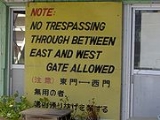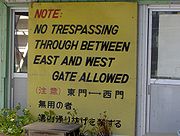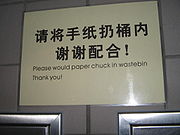
Engrish
Encyclopedia


English language
English is a West Germanic language that arose in the Anglo-Saxon kingdoms of England and spread into what was to become south-east Scotland under the influence of the Anglian medieval kingdom of Northumbria...
usage by native speakers of some East Asia
East Asia
East Asia or Eastern Asia is a subregion of Asia that can be defined in either geographical or cultural terms...
n languages. The term itself relates to Japanese speakers' tendency
Japanese speakers learning r and l
Japanese possesses one liquid consonant, a flap that varies between lateral and central . English has two: an alveolar lateral approximant and rhotic consonant of varying phonetic properties centered around...
to inadvertently substitute the English phoneme
Phoneme
In a language or dialect, a phoneme is the smallest segmental unit of sound employed to form meaningful contrasts between utterances....
s "R" and "L" for one another
Lallation
A Lallation is an imperfect enunciation of the letter "R", in which it sounds like "L", as frequently found in infantile speech.The speech pattern has been particularly associated with the use of the English language by Chinese people and Japanese people. The use of lallation has thus been a common...
, because the Japanese language
Japanese language
is a language spoken by over 130 million people in Japan and in Japanese emigrant communities. It is a member of the Japonic language family, which has a number of proposed relationships with other languages, none of which has gained wide acceptance among historical linguists .Japanese is an...
has one alveolar consonant
Alveolar consonant
Alveolar consonants are articulated with the tongue against or close to the superior alveolar ridge, which is called that because it contains the alveoli of the superior teeth...
in place for both. The related term "wasei-eigo
Wasei-eigo
are Japanese pseudo-Anglicisms: English constructions not used in the English-speaking world or by native English speakers, but that appear in Japanese. This should not be confused for foreign words gairaigo, which generally refer to words from European languages, especially American English...
" refers to pseudo-anglicism
Pseudo-Anglicism
Pseudo-anglicisms are words in languages other than English which were borrowed from English but are used in a way native English speakers would not readily recognize or understand. Pseudo-anglicisms often take the form of portmanteau words, combining elements of multiple English words to create a...
s that have entered into everyday Japanese
Japanese language
is a language spoken by over 130 million people in Japan and in Japanese emigrant communities. It is a member of the Japonic language family, which has a number of proposed relationships with other languages, none of which has gained wide acceptance among historical linguists .Japanese is an...
.
While the term may refer to spoken English, it is more often used to describe written English. Engrish can be found in many places, including signs, menus, and advertisements. Terms such as Japanglish, Japlish or Janglish for Japan
Japan
Japan is an island nation in East Asia. Located in the Pacific Ocean, it lies to the east of the Sea of Japan, China, North Korea, South Korea and Russia, stretching from the Sea of Okhotsk in the north to the East China Sea and Taiwan in the south...
, Konglish
Konglish
Konglish is the use of English words in a Korean context. The words, having initially been taken from the English language, are either actual English words in Korean context, like 모터사이클 , or are made from a combination of Korean and/or English words which are not used in English-speaking...
for Korea
Korea
Korea ) is an East Asian geographic region that is currently divided into two separate sovereign states — North Korea and South Korea. Located on the Korean Peninsula, Korea is bordered by the People's Republic of China to the northwest, Russia to the northeast, and is separated from Japan to the...
, and Chinglish
Chinglish
Chinglish refers to spoken or written English language that is influenced by the Chinese language. The term "Chinglish" is commonly applied to ungrammatical or nonsensical English in Chinese contexts, and may have pejorative or deprecating connotations, reflecting the attitudes of those who apply...
for China
China
Chinese civilization may refer to:* China for more general discussion of the country.* Chinese culture* Greater China, the transnational community of ethnic Chinese.* History of China* Sinosphere, the area historically affected by Chinese culture...
are more specific terms for Engrish.
Roots of the phenomenon
In Japanese Engrish, there are two contributing factors:- First is the great difference between Japanese and English. Japanese word order, the frequent omission of subjectsSubject (grammar)The subject is one of the two main constituents of a clause, according to a tradition that can be tracked back to Aristotle and that is associated with phrase structure grammars; the other constituent is the predicate. According to another tradition, i.e...
in Japanese, the absence of articlesArticle (grammar)An article is a word that combines with a noun to indicate the type of reference being made by the noun. Articles specify the grammatical definiteness of the noun, in some languages extending to volume or numerical scope. The articles in the English language are the and a/an, and some...
, as well as difficulties in distinguishing l and rJapanese speakers learning r and lJapanese possesses one liquid consonant, a flap that varies between lateral and central . English has two: an alveolar lateral approximant and rhotic consonant of varying phonetic properties centered around...
all contribute to substantial problems using English effectively. Indeed, Japanese have tended to score comparatively poorly on international tests of English. Unwittingly poor translations from online language translation tools are used without consulting a native English speaker. - The second factor has been the use of English for "decorative" or "design" rather than functional purposes; i.e., for Japanese consumption, not for English speakers per se, and as a way of appearing "smart, sophisticated and modern", in much the same way as Japanese and similar writing script is used in western fashion. Indeed, it is claimed that in such decorative English "there is often no attempt to try to get it right, nor do the vast majority of the Japanese population ever attempt to read the English design element in question. There is therefore less emphasis on spellSpellingSpelling is the writing of one or more words with letters and diacritics. In addition, the term often, but not always, means an accepted standard spelling or the process of naming the letters...
checking and grammatical accuracy."
In popular culture
Engrish features prominently in Japanese pop culture. Many popular Japanese songs and television-show themes feature disjointed phrases in English amongst the otherwise Japanese lyrics. Japanese marketing firms helped create this popularity, resulting in an enormous array of advertisements, products, and clothing marked with English phrases that seem amusing or bizarre to those proficient in English. These new Engrish terms are generally short-lived, as they are used more for fashion than meaning.Instances of Engrish due to poor translation were frequently found in many early video games produced in Japan. One well-known and popular example of Engrish in pop culture is the video game translation phenomenon "All your base are belong to us
All your base are belong to us
"All your base are belong to us" is a broken English phrase that became an Internet phenomenon or meme in 2000–2002...
", which also became an Internet meme
Internet meme
The term Internet meme is used to describe a concept that spreads via the Internet. The term is a reference to the concept of memes, although the latter concept refers to a much broader category of cultural information.-Description:...
.
Engrish has featured occasionally in the cartoon South Park
South Park
South Park is an American animated television series created by Trey Parker and Matt Stone for the Comedy Central television network. Intended for mature audiences, the show has become famous for its crude language, surreal, satirical, and dark humor that lampoons a wide range of topics...
, such as the song "Let's Fighting Love", used in the episode "Good Times With Weapons
Good Times with Weapons
"Good Times with Weapons" is episode 112 of South Park. The first episode of Season 8, it originally aired on March 17, 2004. The episode's animation routinely switches from the usual cutout-and-solid-color style to a highly stylized anime theme. Asian-style ambience plays in the background.This...
", which parodies the poorly-translated opening theme sequences sometimes shown in anime
Anime
is the Japanese abbreviated pronunciation of "animation". The definition sometimes changes depending on the context. In English-speaking countries, the term most commonly refers to Japanese animated cartoons....
, and in the feature length Team America: World Police
Team America: World Police
Team America: World Police, often referred to as simply Team America, is a 2004 action comedy film written by Trey Parker, Matt Stone, and Pam Brady and directed by Parker, all of whom are also known for the popular animated television series South Park...
where North Korean leader Kim Jong Il is depicted singing the song "I'm so Ronery".
See also
- Non-native pronunciations of EnglishNon-native pronunciations of EnglishNon-native pronunciations of English result from the common linguistic phenomenon in which non-native users of any language tend to carry the intonation, phonological processes and pronunciation rules from their mother tongue into their English speech...
- ChinglishChinglishChinglish refers to spoken or written English language that is influenced by the Chinese language. The term "Chinglish" is commonly applied to ungrammatical or nonsensical English in Chinese contexts, and may have pejorative or deprecating connotations, reflecting the attitudes of those who apply...
- Hong Kong EnglishHong Kong EnglishHong Kong English may refer to two different yet interrelated concepts. The first concept refers to the variation or dialect of the English language used in Hong Kong. The second concept refers to the accent and elements as a result of its use by Cantonese speakers.For the first meaning, Hong Kong...
- Japanese Pidgin EnglishJapanese Pidgin EnglishJapanese Pidgin English is an English-based pidgin that was spoken in Japanese ports, such as Yokohama, in the 19th century....
- KonglishKonglishKonglish is the use of English words in a Korean context. The words, having initially been taken from the English language, are either actual English words in Korean context, like 모터사이클 , or are made from a combination of Korean and/or English words which are not used in English-speaking...
- TaglishTaglishTaglish is a portmanteau of the words "Tagalog" and "English" which refers to the Philippine language Tagalog infused with American English terms. It is an example of code-switching....
- Filipino portmanteau of the words "Tagalog" and "English" - ManglishManglishManglish is an English based creole spoken in Malaysia.The vocabulary of Manglish consists of words originating from English, Malay, Hokkien, Mandarin, Cantonese, Tamil, and to a lesser extent various other European languages, while Manglish syntax resembles southern varieties of Chinese...
- TinglishTinglishTinglish or Thaiglish is the imperfect form of English produced by native Thai speakers due to language interference from the first language...
- Wasei-eigoWasei-eigoare Japanese pseudo-Anglicisms: English constructions not used in the English-speaking world or by native English speakers, but that appear in Japanese. This should not be confused for foreign words gairaigo, which generally refer to words from European languages, especially American English...
- SinglishSinglishColloquial Singaporean English, also known as Singlish, is an English-based creole language spoken in Singapore.Singlish is commonly regarded with low prestige in Singapore. The Singaporean government and many Singaporeans alike heavily discourage the use of Singlish in favour of Standard English...
External links
- Engrish.com—photos of Engrish from Japan, China and elsewhere
- Large Engrish Photo Collection on Weird Asia News
- Engrish Funny —photos of Engrish from around the world
- Translation Party - an online tool that demonstrates how phrases are lost in translation between English and Japanese

